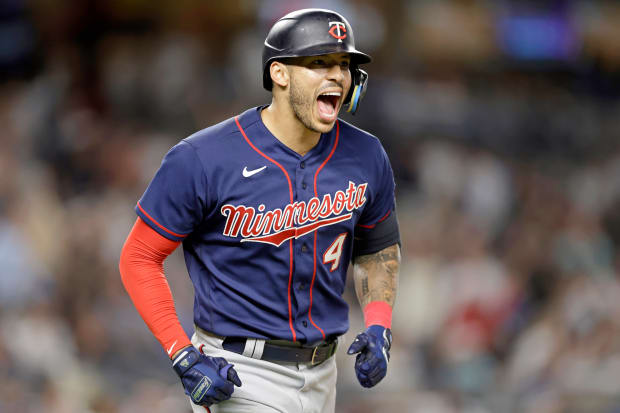NEW YORK — While his peers were asleep, Mets owner Steve Cohen dragged his team closer to the World Series. There’s a metaphor in there. As the other owners discuss financial flexibility, Cohen flexes his finances.
Around 2:30 a.m. ET, hours after a reported 13-year, $350 million deal with the Giants fell through amid disagreements over the results of a physical, Cohen swooped in and signed shortstop Carlos Correa for 12 years and $315 million. (That agreement is pending a physical, which is obviously not a formality.) The Mets’ payroll last year was a franchise-record $264 million; Cohen had already added righty Justin Verlander, for two years and $86.7 million; righty Kodai Senga, for five years and $75 million; lefty José Quintana, for two years and $26 million; and re-signed closer Edwin Díaz, for five years and $102 million; and center fielder Brandon Nimmo, for eight years and $162 million.

Adam Hunger/AP
Baseball Prospectus currently projects the Mets’ payroll at $384.3 million, a league record by some $100 million, and $151.3 million above the threshold. The overage would be higher than the payroll of 13 other teams; seven teams currently are estimated to carry a payroll below the $111.6 million that the Mets will pay in taxes alone. Cohen, whose net worth Bloomberg estimates at $12.8 billion, is an art collector; none of his other pieces will boast the aesthetic wonder of a half-billion-dollar Mets team.
This is what the other owners feared when they reluctantly allowed Cohen to buy the Mets in 2020: He’s embarrassing them. And it’s great for the game.
Cohen is one of three MLB owners who seem to understand the equation that underpins sports: Money buys good players, and good players produce wins. It’s no accident that the other two met in the National League Championship Series in October: the Phillies’ John Middleton, who once promised to “spend money and maybe even be a little bit stupid about it,” added to his pennant-winners 11 years and $300 million for shortstop Trea Turner; and the Padres’ Peter Seidler, who after trying for Turner and the Yankees’ Aaron Judge, pivoted to 11 years and $280 million for shortstop Xander Bogaerts.
This is what it’s supposed to look like. Not like the Red Sox under John Henry, who traded homegrown stud Mookie Betts to the Dodgers before the 2020 season to establish “financial flexibility,” then lowballed homegrown stud Bogaerts, and has been telegraphing he’ll do the same with homegrown stud Rafael Devers. Not even like the Dodgers under John Walter, who are openly trying to reduce their payroll below the luxury-tax threshold this year.
Give the Giants’ Larry Baer some credit for trying: It was reportedly his nine-year, $360 million offer to Judge that the Yankees matched, and he made the high offer to Correa. But Baer was unable or unwilling to seal the deal with Judge, and now he and president of baseball operations Farhan Zaidi have lost Correa in astonishing fashion. And they’ve done so after every other major free agent has signed, leaving them without an obvious pathway to improve a team that finished 81–81 last year.
Meanwhile, the Mets crashed out of the NL wild card series in three games, and it appeared the door was closing on this team: Jacob deGrom, at worst the third-best pitcher the franchise has produced, signed with the Rangers, and the oldest team in the league has only gotten older. But Cohen yanked the door back open. He wanted an ace to pair with Max Scherzer, so he signed Verlander quickly. He wanted another hitter, so he jumped into the Correa bidding late, then lurked while the Giants deal fell apart. No matter that the Mets already have a $341 million shortstop, Francisco Lindor; Cohen will just pay Correa shortstop money to play third base.
That the deal came together six hours before the crosstown rival Yankees introduced their own offseason jewel, homegrown stud Aaron Judge, just makes the whole situation more dramatic. This is an entertainment business, and there is no more entertaining team in the sport right now than the Mets. Cohen understands that. He also understands that the best way to hold a door open is to push stacks of cash in front of it.







